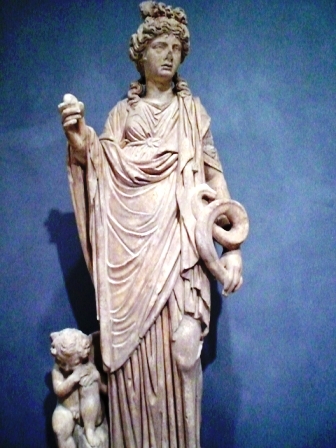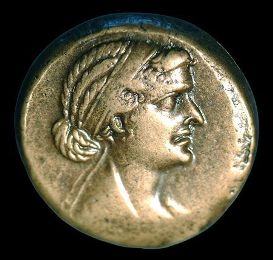
Venus.
Marble, Roman. Getty Villa
Highlights
* Affairs outside of marriage for the elite were
mostly tolerated. The reign of the Emperor Augustus changed this.
*
Chastity meant political loyalty to one's husband, not necessarily
faithfulness. But, extra-marital affairs must not upend the marriage contract.
The contract governed the
family's inheritance and property.
* The Roman gods and Roman religion appear uninterested in the morality of
affairs.
Notable Affairs : Julius Caesar
Julius Caesar was considered one of the greatest
lovers of his time. Clearly, some women were willing to take the risks
of adultery. To his three wives, add many lovers from the patrician
elite.Pompeia
Caesar's second wife, divorced by him.
Caesar allegedly said:
"The wife of Caesar must be above suspicion." What
had she done? Pompeia took her own lover, Clodius,
also a patrician.
Tertulla
Some Roman
attitudes toward affairs would strike us as puzzling.
Tertulla was the wife of Caesar's co-ruler, Crassus. Did Crassus,
one of the richest men in world history, hold their affair against Caesar? Or
against Tertulla? Not
that we can tell.
Servilia
On the other hand
the family of Servilia, Caesar's lover of twenty years,
was actively
opposed to Caesar. Servilia's son, Brutus, led the assassination
gang that murdered Caesar on the Ides of March, 44
BC.
("Et tu, Brutus?")
Cleopatra VII
Cleopatria and Caesar not only
had an affair, they had a son, Caesarion. Gliding into Rome, she was installed in Caesar's private villa,
but the one
across the Tiber, somewhat out of sight and out of
mind.
Though
famous to us, she, the "foreign queen," lacked Roman
citizenship. Caesar did not even
mention his illegitimate son in his will, instead
leaving his political inheritance and wealth to a
nephew, Octavius (later Augustus).
Only later, with
her affair with Marc Anthony, did Cleopatra become a true threat to
Rome. Octavius (later the Emperor Augustus) wanted to make sure Cleopatra and her son were dispensed with.
Cleopatra
foiled him, committing suicide first.
|
|
Affairs in Ancient Rome
Since matrimony was not "holy," affairs outside marriage were not frowned upon
on religious grounds. The Roman gods appear not to have cared. Consequences for husbands who had affairs were few.
For wives, it
could be a different story. For many of the male writers of Rome,
the ideal female was a woman of rank, married, virtuous and chaste, like
our female pictured left.
Roman society during the Republic was ruled by a very narrow, male
oligarchy. To maintain their power, the Roman elite needed clear lines
of inheritance. There could be no confusion about who fathered the baby. A
model Roman wife should be above suspicion.
This left the adulteress wife as the one who might be punished. Often it
was the wife's family, not the husband's, for upsetting the terms
of the marriage contract.
A
Roman elite man could have all the affairs he wanted, with men or with
women of any class, as long as he was the dominant partner.

Cleopatra VII.
Coin, Egyptian, 1st c BC. (c) The
Hunterian, University of Glasgow 2012
|